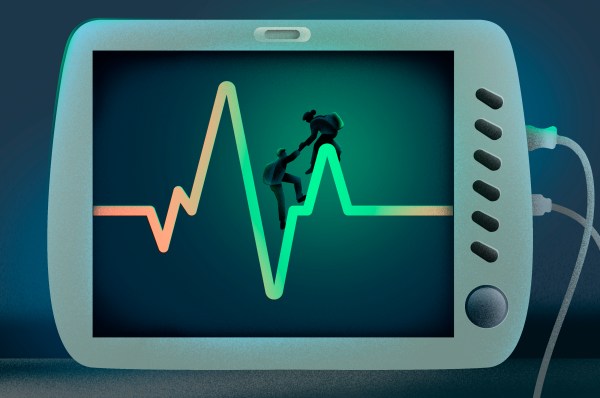In February, Adriana Smith was nearly nine weeks pregnant when she suffered a medical crisis. She went to a hospital in Georgia after experiencing severe headaches. That night, after she came home, her boyfriend called 911 when she started struggling to breathe in her sleep. Her doctors found blood clots in her brain. She never woke up. Her doctors declared her brain dead and she has remained on life support ever since.
The reason Smith has been kept on life support is that her and her unborn son’s doctors have hope that he might grow, develop, and be safely delivered. At press time, he is periviable (around 24 weeks), the point where neonatal intensive care unit (NICU) doctors have reason to hope they can save a preemie. His doctors hope he will make it to 32 weeks and then be delivered by cesarean section.
The story went national because of misreporting that doctors had kept Smith on life support against her will and that of her family due to Georgia’s abortion ban. The facts are these: The law that limited the doctors’ and family’s ability to choose what happened to Smith and her baby was not an abortion law. It was Georgia’s pre-Dobbs law on advance directives.
Smith’s family has told reporters they hope to meet her baby, who they’ve named Chance. They don’t want Smith taken off life support before that happens—but the law also means that the family had no choice in the matter, and they think other families should be free to choose differently. Smith’s case is less specifically about abortion and fetal personhood, then, than it is about who can speak for someone who cannot speak for him or herself.
Georgia’s advance directive law hinges on who can speak for an unborn baby when the mother is silent. The law specifies that, before removing life support measures, a doctor must check whether a patient is pregnant. If she is, the doctor must check whether the fetus is viable. If a baby could safely be delivered at the time of the mother’s medical crisis, he or she must be given the chance.
If the unborn baby has not yet crossed the viability threshold, it is possible to remove the mother’s life support, even though it will cause the unborn baby to die. But, as spelled out clearly in Georgia’s advance directive forms, only one person can authorize the doctor to take this step: the mother. Although the mother can specify her preferences for life support generally, and authorize someone else to speak for her if she cannot or did not fully enumerate her wishes, Georgia does not let her delegate life and death decisions for the unborn baby.
Georgia’s prior case law lays out why the state believes only a mother can make the choice of life and death for her baby. In 1986, a state court was asked to decide whom, if anyone, could decide to end life support for Donna Piazzi, whose unborn baby had reached 20 weeks. (If the case occurred today, her baby would be close to viability, but in the 1980s the viability line was much further out because medical support for premature babies was less advanced). Piazzi’s husband wanted to end life support, but Piazzi’s lover, who had fathered the child, wanted the baby to be born. The court noted that, ordinarily, family members cannot choose to end a patient’s life unless the patient is terminal or in a persistent vegetative state. The baby was neither.
Only one person had the right to end the life of a baby in the womb who might otherwise grow and develop. As the court noted, “The Court furthermore finds no case law or authority in Georgia which supports the right of anyone other than a mother to terminate a quickened fetus that is not yet viable.”
Roe v. Wade gave a right, exclusively to a mother, to end an unborn baby’s life before viability, but the court did not find that that right could float to another family member. Nor did the state inherit this capacity to choose between life and death. In Smith’s case as well, the state does not frame its role as choosing for the family. Rather, the state does not have authority to grant anyone life and death power over a child if the mom didn't specifically allow it.
Georgia isn’t alone in handling advance directives for pregnant women in this way. The majority of states set restrictions on advance directives when withdrawing life support will affect an unborn child. The policy isn’t polarized between pro-choice and pro-life states: Georgia, for example, does better than most states in explicitly calling attention to this policy in the state’s Advance Directive form. Other states set restrictions by statutes, but patients may be totally unaware that they hold.
These laws are motivated by practical and philosophical concerns. In the rare cases where a mother experiences brain death while pregnant, continuing life support often allows the baby to survive; in a small study of 35 patients, 27 babies were born alive. The closer a fetus is to the threshold for safe delivery when his or her mother goes into crisis, the better its odds of survival. Because Chance lost his mother at nine weeks, when he would have been the size of a cherry, his chances are worse. But at least one other child who lost his mother at 12 weeks of pregnancy survived delivery and flourished.
What happens to Chance depends on his luck and his medical team. But Smith’s case shows how quickly we can lose our own capacity to speak for ourselves. Any of us may find we suddenly rely on the balance of what the law allows and the prudential judgement of the people we have entrusted ourselves to. The capacities and interventions that seemed very abstract when presented as a series of choices initially may seem very different in the moment.
Georgia allows a mother to entrust her child to be raised by someone else if she dies, but it does not allow her to delegate the choice about whether her unborn child will live. After the umbilical cord is cut, each of us can newly be entrusted to our mothers, or someone else, for the choice about what medical treatments to consent to on our behalf. With the ever growing scope of medical aid in dying to encompass even those who are not dying or physically sick, we may soon ask others to decide whether we should receive the “treatment” of a medically induced death.
How can any of us delegate this responsibility? For the late philosopher Alasdair MacIntyre, the question of what it means to be a medical proxy hinged on what it means to be a friend. In his book Dependent Rational Animals, he considers the relationship between medical proxies and “those disabled who are unable to speak for themselves.” To be a good proxy, MacIntyre argues, it is not enough to be medically informed or generally empathetic. As he sees the responsibility of the proxy:
The radically disabled individual needs someone who will speak for her or him as, so to speak, a second self. And, since we are all potentially liable to this extreme condition, we all of us now or later may need someone to be our second self, to speak for us. Yet no one will be able to speak adequately for me who does not already know me…This relationship then between those who have become radically disabled, so that others have to speak for them, generally has to be rooted in previously existing relationships of friendship.
In practice, medical guidance is often very far from the intimacies of friendship that MacIntyre requires. The more vulnerable the person who requires a proxy, the less likely they are to be known as an individual, rather than as a member of a class. In practice, when medical professionals try to quantify the experiences of the disabled, they rely on the anticipations of the currently abled—with no prerequisite of a MacIntytean friendship.
Measures like QALYs (Quality Adjusted Life Years) and DALYs (Disability Adjusted Life Years)—which are used to prioritize everything from medical research for cures to rationing ventilators during COVID—ask able-bodied participants to estimate how much worse a life marked by disability is than an imagined “standard” life. Raters are asked to estimate in what ratios they’d prefer to save “normal” lives over disabled ones. The estimates made by abled evaluators diverge sharply from those of people who live with the conditions they’re rating; indeed, as researchers noted in one acid essay in 2009: “The rationale for excluding people with disability from the DALY rating process was that they typically overstate their quality of life relative to how nondisabled people perceive it to be and that the perceptions of the latter are more appropriate to use.”
Cleaving the world into disabled and non-disabled people is an unstable categorization. It is common to cross back and forth between these categories, and nearly all of us are at least partially disabled as we prepare to die. Infancy is not classed as a formal disability, but babies are among those who cannot speak for themselves and are unable to perform the activities of daily living unassisted.
Baby Chance is entrusted to his mother—and her voice, or her silence, governs how his good is preserved. For the rest of us, in our periods of need, we will not be able to rely on the law or, increasingly, on the natural family to choose who can speak for us. More and more seniors will be so-called “kinless adults” who have neither spouse nor children to be their proxy. In a world with weaker family ties, preparing for death and disability means seeking out lifelong friendships, especially intergenerational ones, beginning as early in life as possible.
For MacIntyre, it is only at our end that we come to fully understand our beginning. By being loved in our incapacity (and by loving others in theirs) we glimpse how we were loved in our infancy, the part of our life lost to our memory. Baby Chance is too young for friendship. But, if he lives, he will come to glimpse how his mother loved him before her death and the faith it requires to love the silent.







Please note that we at The Dispatch hold ourselves, our work, and our commenters to a higher standard than other places on the internet. We welcome comments that foster genuine debate or discussion—including comments critical of us or our work—but responses that include ad hominem attacks on fellow Dispatch members or are intended to stoke fear and anger may be moderated.
With your membership, you only have the ability to comment on The Morning Dispatch articles. Consider upgrading to join the conversation everywhere.